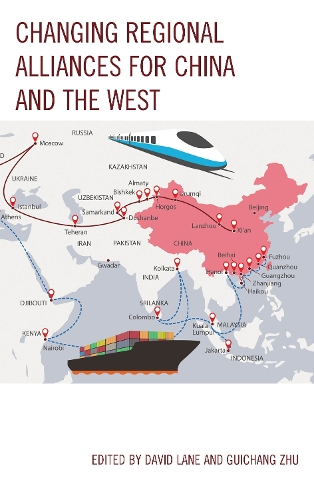
Changing Regional Alliances for China and the West
(Hardback)
Publishing Details
Changing Regional Alliances for China and the West
By (Author) David Lane
Edited by Guichang Zhu
Contributions by David Lane
Contributions by Stefan Schmalz
Contributions by Richard T. Griffiths
Contributions by Akram Umarov
Contributions by Harry Roberts
Contributions by Xueyu Wang
Contributions by Mohammad Razaul Karim
Contributions by Mikhael A. Molchanov
Bloomsbury Publishing PLC
Lexington Books
15th November 2017
United States
Classifications
Professional and Scholarly
Non Fiction
327.51
Physical Properties
Hardback
348
Width 160mm, Height 236mm, Spine 28mm
621g
Description
Since the end of the World War II, nation states have formed regions to give them some protection from the processes of globalization and internationalization. Against this background, the contributors consider the position of China in the processes of regional competitive interdependency. This book offers analysis at three levels: internal, regional, and global. Chapters consider Chinas position in regional post-socialist associations such as the BRICS, the Shanghai Cooperation Organization (SCO), the Eurasian Economic Union (EEU), the Silk Road Economic Belt and the One Belt, One Road (OBOR). Contributors discuss how membership in these regional bodies is likely to enhance Chinas economic power, strategic position, and political importance. A major theme addressed is whether these new powers will become complementary to the American-led economic core countries or evolve as countervailing powers. Contributors suggest that linkages favored by Chinas regional associations are more network based and informal in character. They are more in keeping with regionalization rather than regional blocs such as the European Union, which have locked in members to market-driven institutions. Thus, these new developments move away from a neo-liberal market perspective and satisfy the needs of members to retain their economic and political sovereignty. This book considers whether these new regional blocs led by China will perform a transformative process for the international order or become an alternativesupplementary to, but not replacing, the existing institutions of the North. An important topic is the relationship of Russia and China to the Central Asian countries of the former USSR and the interaction between the Russia-led Eurasian Economic Union and the Chinese initiative of the Silk Road Economic Belt. There is potential for the evolution of an alliance between China and Russia against the neo-liberal order led by the USA. Concurrently, they bring out possible the tensions between Russias and Chinas conflicting interests over influence in Central Asia. Reactions to Chinas rise include the Trump administrations movement from a multilateral to a bi-lateral trade policy and the threat of discriminatory tariffs for China. The contributors seek to promote a better appreciation of Chinas role in regional associations, and the implications of contemporary developments in economic, geo-political, and international political affairs in the 21st century.
Reviews
This book is a great interdisciplinary study of power politics. Analyses of Russian, Chinese, and US policies in the region are combined with a number of interesting case studies on institutional aspects of BRICS Development Bank and Silk Road developmental effects written by scholars from the region. Absolute must read for anyone who wants to understand Eurasia. -- Vsevolod Samokhvalov, University of Cambridge
Changing Regional Alliances for China and the West brings together an impressive array of expertise and perspectives, opening up new possibilities and alternatives for understanding China and its regional initiatives. The result is a rich and fascinating book that goes beyond geopolitics, inviting us to challenge prevailing views and preconceptions of China and its relations with the wider world. It represents a truely unique collection of ideas and perspectives, and is essential reading for those eager to understand the significance of China in shaping new regional and world orders. -- Paul Richardson, University of Birmingham
Author Bio
David Lane is emeritus fellow of social sciences at Emmanuel College. Guichang Zhu is professor of international studies and research fellow in the Center for European Studies at Shandong University.
